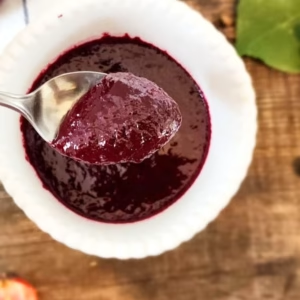
Chokecherry and Crab Apple Jam (Low-Sugar, No-Pectin)
Put your chokecherry and crab apple harvest to good use with this delicious homemade jam, naturally low in sugar and made without added pectin. It’s a unique recipe you won’t find on store shelves, and it’s as versatile as it is tasty: Spread it on bread or waffles, stir it into yogurt, or even use it as a filling for pies and cookies.
Equipment
- large pot with lid
- large bowls
- Stainless steel food mill.
- Mason jars.
Ingredients
- 2 lbs ripe chokecherries
- 2-3 cups crab apples
- 1 cup sugar or more, to taste
- 1/2 lemon juiced
- 3½ cups water
Instructions
- Add about 2 lbs of chokecherries to a large pot with 2 cups of water. Bring to a boil, then reduce the heat to low. Cover and simmer for about 20 minutes, stirring occasionally and gently pressing the berries to release their juices.
- Meanwhile, clean the crab apples, cut them in half, and trim away any spoiled spots. Place them in a saucepan with ½ cup of water and simmer for about 20 minutes, or until the apples are soft and most of the liquid has evaporated.
- Assemble your food mill with the fine disc. Once the crab apples are soft, run them through the mill, collecting the pulp in a bowl. Set aside.
- Clean the mill and reassemble it with the coarser disc. Working in 2–3 batches, process the chokecherries through the mill, extracting as much juice and pulp as possible. Set the pulp aside.
- Return the remaining chokecherry seeds and skins from the food mill to the pot. Add 1 cup of water, cover, and simmer for another 20 minutes.
- Strain the chokecherry mixture through a cheesecloth or clean tea towel set over a strainer, or run it through the food mill again to separate out the juice and pulp.
- Combine all the chokecherry pulp and juice with the crab apple pulp in your large (clean) pot. Stir in 1 cup of sugar (or more, to taste) and the juice of half a lemon.
- Bring the mixture to a boil over medium-high heat, stirring frequently. Reduce the heat to medium-low and let the jam cook gently for about 20 minutes, stirring often to prevent sticking.
- The jam will begin to thicken as it cooks. To check for doneness, use the chilled saucer test: place a spoonful of hot jam on a cold plate, wait a few seconds, then push it with your finger — if it wrinkles, it’s ready. Once done, ladle the hot jam into clean mason jars (this batch filled two 500 ml jars). Seal with lids, then process the jars in a boiling water bath for 15 minutes for long-term storage if needed.
Notes
Any crab apple variety will work, but avoid ones that are extremely bitter. Make sure chokecherries are fully ripe (deep purple-black).
This jam uses less sugar than usual. For a sweeter jam, add more sugar to taste.
Keeps for up to 1 year if properly canned in a water bath and sealed. Refrigerate after opening and consume within 10 days.